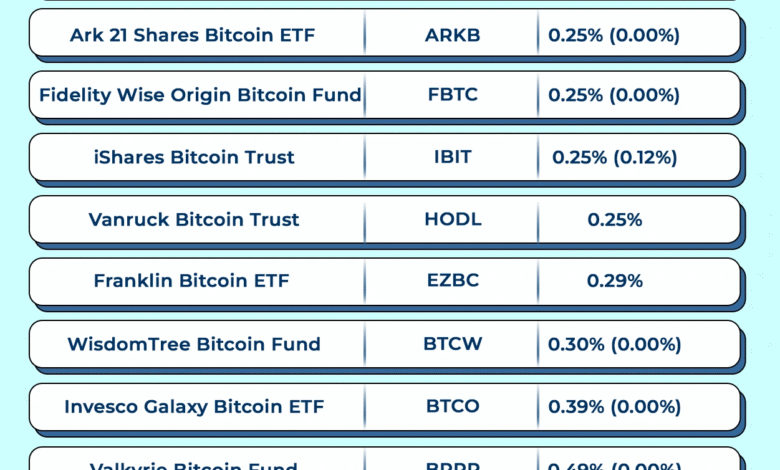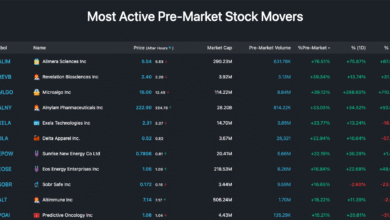Bitcoin ETFs See Strong Recovery with $247 Million Inflow

Bitcoin ETFs are emerging as a compelling avenue for investors seeking exposure to cryptocurrency markets without the challenges of direct ownership. Over the past week, these Bitcoin exchange-traded funds have shown a remarkable recovery, garnering significant net inflows that reflect growing institutional interest in Bitcoin and other digital assets. With a total influx nearing $247 million, BTC ETFs are capturing the attention of both seasoned and novice investors alike. This trend signals not only a resurgence in Bitcoin investments but also a broader acceptance of crypto ETFs as legitimate financial instruments. As institutional players continue to pivot towards these types of investments, the landscape for Bitcoin ETFs appears increasingly promising.
The rise of Bitcoin exchange-traded funds marks a transformative moment in the world of digital finance, showcasing an innovative way to invest in cryptocurrencies. These funds, often referred to as crypto ETFs, provide diversified exposure to Bitcoin and are becoming popular among investors navigating the volatility of the crypto landscape. The notable uptick in assets managed by these instruments illustrates the strong institutional interest in Bitcoin and the demand for accessible investment options. Moreover, similar structures like Ether ETFs are also gaining traction, reinforcing the shift towards mainstream acceptance of cryptocurrencies. As investors seek to capitalize on this evolving space, the allure of such funds continues to grow.
The Resurgence of Bitcoin ETFs
Bitcoin exchange-traded funds (ETFs) recently demonstrated a remarkable recovery after experiencing initial losses. With a total of $246.75 million in inflows for the week, Bitcoin ETFs showcased their ability to attract investor interest even amidst volatility. Significant contributions from top players like Blackrock’s IBIT ($188.92 million) and Bitwise’s BITB ($62.26 million) highlight a growing confidence among institutional investors. These funds are reinstating the notion that Bitcoin remains a critical component in diversified investment portfolios, particularly as institutional interest in Bitcoin continues to flourish.
The newfound inflows indicate a potential shift in the market where investors, previously cautious due to fluctuations, are now seeking to capitalize on Bitcoin’s long-term growth potential. The diversity of contributions from other funds such as Grayscale’s Bitcoin Mini Trust and Vaneck’s HODL underscores a broadening acceptance of Bitcoin ETFs. As more institutional players come on board, we may witness increased liquidity and trading volumes, further solidifying Bitcoin’s position as a leading asset in the crypto investment landscape.
Understanding Ether ETFs and Their Appeal
While Bitcoin remains a flagship cryptocurrency, ether ETFs have also gained significant traction, especially with a net inflow of $326.83 million last week. The driving force behind this surge seems to be consistently strong institutional interest, further augmented by the performance of leading ETFs such as Blackrock’s ETHA and Fidelity’s FETH, which both contributed substantial inflows. The enthusiasm surrounding ether ETFs reflects a broader trend in the cryptocurrency market, where investors are beginning to recognize the potential of Ethereum and its associated technologies.
Moreover, the resilience of ether ETFs is indicative of a growing acceptance of crypto assets among mainstream investors. With daily transactions reaching impressive volumes, ranging from $1 billion to $2 billion for ETH ETFs, it is clear that demand is robust. As institutional interest in Bitcoin and Ether grows, the dynamics of crypto investments evolve, paving the way for a more mature market. This rise reflects not just speculative trends but also a genuine interest in the underlying technology that powers these assets.
The Impact of Institutional Interest in Bitcoin
Institutional interest in Bitcoin plays a crucial role in shaping the trajectory of Bitcoin ETFs and the wider cryptocurrency landscape. The recent inflows into Bitcoin ETFs underscore a significant shift where institutional investors are increasingly viewing Bitcoin as a legitimate asset class. This change is evident in the financial engagements of major firms, which also influences retail investor perceptions, leading to increased participation in the market.
As institutions continue to allocate capital toward Bitcoin, the demand for related investment vehicles, such as Bitcoin ETFs, is expected to rise accordingly. Such investments are indicative of a maturation phase within the crypto sector, characterized by regulatory developments and enhanced product offerings. The ongoing trend suggests that Bitcoin is not just a speculative asset but is becoming a strategic investment for institutional portfolios, driven by the search for diversification and hedging against inflation.
Market Trends: Trading Volumes and Activity
Analyzing the trading volumes of Bitcoin and ether ETFs over the past week reveals a robust market activity that cannot be overlooked. Daily transactions for BTC ETFs have hovered between $3 billion to $4 billion, indicating a healthy appetite for Bitcoin investments. Such high levels of engagement resonate with the overall buoyancy in the market, showing that traders and investors remain active even amidst fluctuations in price.
The sustained trading activity suggests a solid belief among participants in the longevity and potential appreciation of cryptocurrencies. This momentum reinforces the relevance of both Bitcoin and ether ETFs as essential tools for investors seeking exposure to the crypto market. As trading volumes stabilize, it signals not only growing investor confidence but also a shift toward a more stable investment environment where informed decision-making thrives.
Performance Analysis of Leading Bitcoin ETFs
When examining leading Bitcoin ETFs, it becomes evident that their performance is closely correlated with market sentiment and institutional capital flows. Specifically, Blackrock’s IBIT led the charge with a remarkable $188.92 million in net inflows, demonstrating its prominence in the sector. Additionally, Bitwise’s BITB and other entities have also shown significant growth, further diversifying the landscape of Bitcoin ETFs available to investors.
Such performances aid in understanding which funds resonate more with investors, providing insights into the preferences of institutional versus retail investors. As more investors evaluate their Bitcoin investments through these ETFs, analyzing past performance alongside market conditions will become increasingly pivotal in shaping future capital allocations.
The Role of Regulatory Environment in Crypto ETFs
The regulatory environment surrounding cryptocurrencies and ETFs is a critical factor influencing investor confidence and capital flow. With ongoing discussions in various regulatory bodies, clarity surrounding Bitcoin ETFs is essential for institutional and individual investors alike. Regulatory approvals not only bolster investor confidence but also set the stage for wider institutional adoption.
As regulators move to craft frameworks for Bitcoin and ether ETFs, we can expect a ripple effect on market dynamics. Positive regulatory advancements can lead to heightened participation from institutional entities, further propelling Bitcoin investments into the mainstream. Therefore, the intersection of regulation and market sentiment will likely dictate the future success of crypto ETFs.
Future Outlook for Bitcoin and Ether ETFs
As we look forward, the outlook for Bitcoin and ether ETFs remains encouraging. With ongoing investor interest and increasing allocations to these assets, we can anticipate continued growth in inflows. Institutional players are likely to drive much of this growth, as evidenced by the strong financial contributions made by prominent ETFs during the past week.
Furthermore, the introduction of innovative investment products linked to Bitcoin could bolster interest and participation from both retail and institutional investors. Innovations in fund structures may also open up new avenues for capital, enhancing the attractiveness of Bitcoin ETFs. Ultimately, the future landscape holds promise for Bitcoin and ether ETFs as they evolve and adapt to market needs.
Comparative Analysis: Bitcoin vs Ether ETFs
In comparing Bitcoin and Ether ETFs, it’s critical to evaluate not only inflow figures but also market dynamics that affect both assets differently. Bitcoin ETFs, characterized by their substantial net inflows, seem to attract traditional investors seeking stability and proven performance. On the other hand, ether ETFs often appeal to those looking for growth potential in emerging technologies, given Ethereum’s position in decentralized applications and smart contracts.
Understanding these comparative aspects helps investors make informed decisions on portfolio allocations. While Bitcoin may provide a more stable investment route, ether offers opportunities for exponential growth in line with technological advancements. As both assets mature, the choice between Bitcoin and Ether ETFs will ultimately depend on individual investment goals and risk tolerance.
Investment Strategies for Crypto ETFs
Developing effective investment strategies for Bitcoin and Ether ETFs requires a keen understanding of market trends and individual asset dynamics. For Bitcoin ETFs, a conservative approach might involve dollar-cost averaging, allowing investors to spread their capital across various entry points. It reduces the impact of volatility and fosters a long-term investment mindset, which is critical in the ever-fluctuating crypto market.
In contrast, for those exploring Ether ETFs, a more aggressive strategy may be warranted to capitalize on the asset’s potential for rapid value appreciation. Given the increasing institutional interest and real-world applications of Ethereum, investors might seek to take larger positions during dips to maximize gains. Ultimately, successful strategies will be those that incorporate market analysis, risk management, and an understanding of investor psychology.
Frequently Asked Questions
What are Bitcoin exchange-traded funds (ETFs) and how do they work?
Bitcoin exchange-traded funds (ETFs) are investment vehicles that track the price of Bitcoin, allowing investors to buy shares that represent Bitcoin ownership. Unlike direct Bitcoin investments, Bitcoin ETFs offer easier access through traditional brokerage accounts, simplify tax reporting, and enhance liquidity. They function similarly to stocks, making it simpler for institutional and retail investors to gain exposure to Bitcoin without handling the cryptocurrency directly.
How are Bitcoin ETFs performing in the current market?
Bitcoin ETFs have recently shown strong performance, recovering from initial losses to achieve a net inflow of $246.75 million for the week. Leading funds such as Blackrock’s IBIT and Bitwise’s BITB have attracted significant investments, illustrating a robust institutional interest in Bitcoin despite earlier market volatility.
What factors contribute to the popularity of crypto ETFs like Bitcoin ETFs and Ether ETFs?
The popularity of crypto ETFs, including Bitcoin ETFs and Ether ETFs, is driven by their accessibility, regulatory clarity, and the growing institutional interest in Bitcoin and Ether. These funds provide a regulated investment option for investors looking to enter the cryptocurrency market without directly purchasing cryptocurrencies, which can involve more complex storage and security concerns.
What are the benefits of investing in Bitcoin ETFs compared to direct Bitcoin investments?
Investing in Bitcoin ETFs offers several benefits over direct Bitcoin investments, including easier market entry via brokerage accounts, standardized pricing, enhanced liquidity, and reduced risks associated with managing private keys. Additionally, Bitcoin ETFs typically offer more straightforward tax implications due to their structure.
What is the impact of institutional interest in Bitcoin on Bitcoin ETFs?
Institutional interest in Bitcoin significantly impacts Bitcoin ETFs by driving inflows and stabilizing prices. The recent net inflows into Bitcoin ETFs, totaling over $246 million, indicate that institutional investors are reallocating capital into these funds, boosting investor confidence and signaling an optimistic market outlook.
Which Bitcoin ETFs have gained the most inflows recently?
Recently, Bitcoin ETFs such as Blackrock’s IBIT led the way with an impressive inflow of $188.92 million. Other notable contributors included Bitwise’s BITB with $62.26 million and Grayscale’s Bitcoin Mini Trust, which added $30.58 million, demonstrating strong interest and performance in the Bitcoin ETF market.
How do trading volumes for Bitcoin ETFs compare to those of Ether ETFs?
Trading volumes for Bitcoin ETFs currently range between $3 billion to $4 billion daily, while Ether ETFs see lower volumes between $1 billion to $2 billion. This indicates a stronger demand for Bitcoin ETFs at this time, though Ether ETFs have also demonstrated significant growth alongside institutional investments.
What recent trends are shaping the future of Bitcoin investments through ETFs?
Recent trends shaping Bitcoin investments through ETFs include increased institutional involvement, ongoing regulatory developments, and market recovery dynamics. The positive sentiment shift observed in recent weeks suggests sustained appetite for Bitcoin, driving further innovation and potentially more diversified Bitcoin ETF offerings to meet investor demand.
| ETF Name | Weekly Inflow ($ million) | Notable Outflows ($ million) |
|---|---|---|
| Bitcoin ETFs | 246.75 | FBTC: -55.18 BRRR: -6.44 ARKB: -5.76 |
| Blackrock’s IBIT | 188.92 | |
| Bitwise’s BITB | 62.26 | |
| Grayscale’s Bitcoin Mini Trust | 30.58 | |
| Vaneck’s HODL | 25.57 | |
| Grayscale’s GBTC | 3.40 | |
| Franklin’s EZBC | 3.38 | |
| Ether ETFs | 326.83 | |
| Blackrock’s ETHA | 105.44 | |
| Fidelity’s FETH | 109.05 | |
| Grayscale’s ETHE | 28.86 | |
| Ether Mini Trust | 22.74 | |
| Bitwise’s ETHW | 32.63 | |
| Vaneck’s ETHV | 12.27 | |
| Franklin’s EZET | 5.84 | |
| Invesco’s QETH | 5.08 | |
| 21Shares’ CETH | 3.94 |
Summary
Bitcoin ETFs showcased remarkable resilience as they recovered from early-week losses, culminating in a significant net inflow of $247 million. This strong performance is indicative of the sustained demand and renewed investor confidence in the cryptocurrency market. The bullish sentiment, particularly seen in the massive inflows into both Bitcoin and Ether ETFs, demonstrates that institutional interest in crypto is not waning but rather intensifying.




